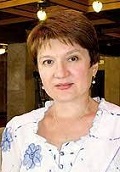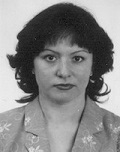Department of Neurology
Scientific work
Responsible employees:
Sokolova Larysa Ivanivna

Dovbonos Tetiana Anatoliivna

Kyiv City Clinical Hospital #4, Neurological Department No. 2
Directions of research work
- To investigate the pathomorphosis of vascular and autoimmune diseases of the nervous system against the background of coronavirus disease
Scientific developments, achievements, priorities, achievements
- Scales for assessing neurological deficits in stroke are widespread and adapted for their use in neurological practice
- A significant contribution was made to the study and dissemination in domestic angioneurology of the idea of subtypes of TIA and strokes, as well as forecasting their course and consequences
- A stroke risk assessment scale after TIA was developed depending on its pathogenesis
- The distribution of subtypes of ischemic stroke and the clinical and paraclinical characteristics of the disease in young patients were determined
- Issues of the pathogenetic role of stress hyperglycemia in ischemic stroke and its impact on the consequences of a stroke have been studied. The pathophysiological mechanisms of the development of dysphagia in stroke have been summarized and supplemented, and a method of diagnosis and assessment of its severity has been developed.
- The relationship between the localization of the ischemic focus in the cerebellum and/or the brain stem, as well as the volume of the infarcted focus with the development of systemic dizziness and neurocognitive disorders in patients with acute ischemic stroke in the vertebral-basilar basin was established.
- Conducted clinical and experimental study of the role of viral infection in the development, course and consequences of acute ischemic disorders of cerebral blood circulation.
- The need to reduce the manifestations of local post-ischemic inflammation and proposed methods of its correction are pathogenetically substantiated.
- The importance of coagulopathy as a significant component of the pathogenesis of ischemic stroke in SARS-CoV-2-positive patients has been proven
- The expediency of an optimized system of prevention and medical care for patients with cerebrovascular diseases in the conditions of a modern metropolis is substantiated
- The potential effectiveness of the treatment of cerebral stroke in the conditions of an integrated stroke unit was demonstrated by analyzing the therapeutic effect on the dynamics and degree of recovery of neurological functions in different periods of the disease
- Clinical-neurophysiological, neuroimaging and hemodynamic profiles of migraine status and migraine-induced stroke were studied.
- The studied range of motor (spasticity), psycho-emotional, cognitive and sexual disorders in patients with multiple sclerosis and proposed methods of their correction.
- Clinical, neurophysiological and therapeutic aspects of peripheral nervous system damage in patients with multiple sclerosis and chronic inflammatory demyelinating polyneuropathy were analyzed.
A diagnostic algorithm for acute diffuse encephalomyelitis and clinically isolated syndrome was developed and mathematical models for predicting them in multiple sclerosis were proposed.
The potential impact of Covid-19 on the course of autoimmune diseases of the nervous system (myasthenia, multiple sclerosis, Guillain-Barré syndrome) was assessed.
Reasoned and proposed effective schemes for the treatment of multiple sclerosis depending on the course, degree of disabling stage and duration of the disease, which improve the quality of life of patients.
Theses have been defended over the past 10 years
Doctoral
- Volodymyr Stepanovych Melnyk.
The course of ischemic stroke depending on genetic polymorphism and changes in the hemostasis system. 2015.
- Kobys Tatyana Oleksandrivna. The course and prediction of the activity of the demyelinating process in patients with multiple sclerosis and ways of its correction. 2016.
- Maria Myroslavivna Prokopiv. Medical and social substantiation of an optimized system of prevention and medical care for the population with cerebrovascular diseases at the level of a metropolis in the conditions of health care reform. 2021
- Nataliya Stepanivna Turchyna. Clinical and experimental substantiation of the role of viral infection in the development, course and consequences of acute ischemic disorders of cerebral circulation. 2021.
Candidates
- Fartushna O.E. Pathogenetic subtypes of transient ischemic attacks: features of the neurological clinic and treatment, 2012.
- Sepide Sepehri Nur. Clinically isolated syndrome: neurological manifestations, diagnosis and prognosis of transformation into multiple sclerosis. 2013.
- Gudzenko Hanna Volodymyrivna. Clinical course, indicators of quality of life and disability of patients with multiple sclerosis depending on the type of treatment. 2013
- Kateryna Volodymyrivna Antonenko. Risk factors, features of the clinical picture and consequences of ischemic heart attacks of the vertebral-basilar basin. 2013
- Karnaukh Yury Dmitorovych. Clinical and neurophysiological characteristics of peripheral nervous system damage in multiple sclerosis and chronic inflammatory demyelinating polyneuropathy, modern approaches to treatment. 2013.
- Sepikhanova Maryna Muradasivna. Course, diagnosis and treatment of multiple sclerosis in patients of different age groups. 2015.
- Rogoza Svitlana Volodymyrina. Clinical and neuroimaging characteristics and prediction of the course of supratentorial intracerebral hemorrhages in patients with arterial hypertension 2016.
- Trepet Anna Serhiivna. Isolated cerebellar infarctions: features of coordination and neuropsychological disorders in the dynamics of treatment in the acute and recovery periods. 2017
- Nataliya Vasylievna Bobryk-Zagoruyko. Clinical and epidemiological characteristics of multiple sclerosis in the Volyn region. 2017
- Babenko Vasyl Vasyliovych. Ischemic stroke against the background of metabolic syndrome: features of the clinical course and pathogenetic therapy. 2017
- Shandyuk Victoria Yuriivna. Peculiarities of the course of the acute and recovery periods of atherothrombotic and cardioembolic subtypes of ischemic stroke depending on the state of systemic fibrinolysis. 2018
- Yuliya Vasylivna Khizhnyak Clinical and neuropsychological correlations in patients with multiple sclerosis. 2019
- Yuliya Petrovna Didkova. Clinical-neurophysiological, neuroimaging and hemodynamic characteristics of migraine complications (migrainous status and migraine-induced stroke). 2019
- Nataliya Stanislavivna Radzikhovska. Sexual dysfunction in patients with multiple sclerosis, dependence on the course of the disease and treatment. 2017
- Nebor Yaroslav Yaroslavovich. Clinic, course and prognosis of ischemic stroke in young people. 2021
- Domres Natalia Vadimovna. Clinical and paraclinical characteristics and treatment of spasticity in patients with multiple sclerosis. 2021
Over the past 5 years, the department’s employees have published:
Textbooks – 2
Manuals – 5
Monograph – 3
Three Web of science articles, 24 Scopus articles, 73 B-category specialized journals of the Academy of Sciences of the Ministry of Education and Science of Ukraine
72 theses
140 reports at scientific forums
The total Hirsch Index according to Google Scholar is 69, according to Web of Science – 4.
Obtaining patents – 7
New methods of diagnosis, treatment and prevention were developed and implemented – 9
The results of the conducted research work are implemented in the treatment and diagnostic process of the neurological departments of the Oleksandrivska Clinical Hospital, Kyiv City Hospitals No. 3, 4, 6, 9, and the Kyiv City Clinical Hospital of Emergency Medical Care.
A scientific and practical conference with international participation is held annually on the basis of the department.







